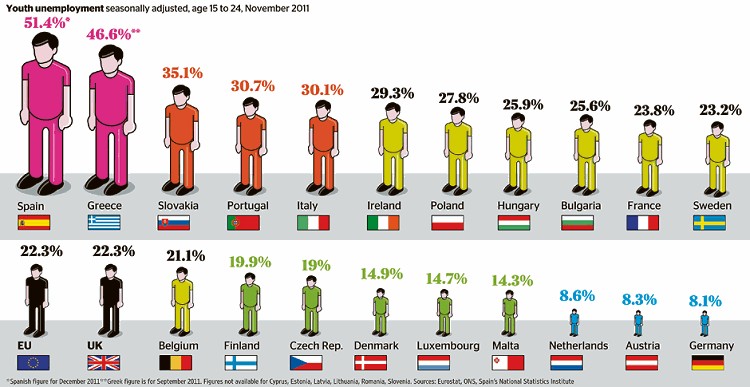

Jobless record shows European dream has forsaken* the young
Source: TimesOnline, January 28 2012
It wasn’t supposed to be like this. After six decades of peace, Europe should be basking* in a golden age of prosperity. Instead its young are being ravaged* by unemployment, with a record 5.6 million under-25s out of work.
Just over a million of the young unemployed are in Britain, the worst level in the country since figures began to be collected by Eurostat, the EU statistics agency, in 1983.
Bleak as Britain’s young jobless rate of 22.3 per cent is, the picture is far worse in eurozone countries enforcing deep austerity* measures. As Spain’s jobless count broke the 5 million barrier yesterday, unemployment for those aged 16 to 24 was put at 51.4 per cent, meaning that for the first time in a modern European country a majority of the young are out of work.
In Greece the young jobless figure is 46.6 per cent, and in Portugal 30.7 per cent, according to Eurostat.
As never before in peacetime, Europeans are on the move in search of work. From Dublin to Athens, politicians are desperate to prevent the blight of emigration from draining* the best young minds from communities where their energy and dynamism will be needed for recovery.
The rising jobs toll has put the issue at the top of the agenda in the French presidential election, at the core of recovery programmes in Italy and Spain and central to rioters’ complaints on the streets in Romania.
“The eurozone crisis is the No 1 biggest threat to growth and employment outcomes, not only in Europe and the US, but in other regions, like Asia, which depend on exporting to Europe,” said Steven Kapsos, an economist in the Employment Trends Unit of the International Labour Office (ILO) in Geneva, which this week warned of the “urgent challenge” of creating jobs to preserve social cohesion. “Europe needs to grow because that is the only real long-term solution. But the tide of uncoordinated austerity that is taking place right now is probably going in the exact opposite direction.”
The ILO predicts that unemployment across Europe will rise this year from 23.7 million to more than 24 million, approaching the 1994 record of 25 million. In the eurozone of 17 nations, unemployment is at a high of 10.3 per cent, the worst since the currency was introduced in 1999.
Germany, Europe’s biggest economy, is one of the few eurozone countries where unemployment is falling, with 5.5 per cent out of work, down from 6.76 per cent in 2010. It is acting like a magnet for skilled workers who have lost hope in their own countries. Angela Merkel had only to mention the shortage of medical professionals in Germany on a visit to Madrid last year to start a stampede*.
“The prospects for nurses are bad in Spain because of the crisis, especially with the healthcare cuts,” said Jennifer Rouco, 25, a nursing student from Girona, in Catalonia, during a break at a language school in Berlin, where the students come from Spain, Italy and France. Like thousands of others, Ms Rouco is planning to leave family and friends behind. “I see Germany as the big engine of Europe, an example for the rest,” she said.
................................
This was not how the founding fathers of Europe saw their brave new continent when they drafted the treaty that founded the EU. The Treaty of Rome “resolved to ensure the economic and social progress of their countries by common action to eliminate the barriers which divide Europe, affirming as the essential objective of their efforts the constant improvement of the living and working conditions of their peoples”.
For the past 50 years, massive sums have been transferred from the richest EU nations to the poorest. The EU plans €347 billion in such transfers between 2007 and 2013. Yet the destruction of jobs in southern countries is widening the chasm between them and the AAA-rated north.
Job creation is on the agenda for the EU summit on Monday but there is little sign of a co-ordinated plan. The draft conclusions urge more apprenticeships, unspecified help for small businesses and even more cash for disadvantaged regions. But there is an ideological stalemate between advocates of more social protection and those pushing for greater labour market flexibility.
.............................
725 words
Annotations:
* to forsake - aufgeben, im Stich lassen
* to bask - sich sonnen (fig.)
* to ravage - here: heimsuchen
* austerity measures - Sparmassnahmen
* to drain - aufzehren
* stampede - Massenansturm
Assignments:
1. Looking at current jobless figures, where in Europe are the unemployment rates among young people the highest? Can you think of any reasons for these high numbers, particularly in Spain and Greece?
2. What will the consequences of the high unemployment rates be for above mentioned countries?
3. Southern European countries profitted most from their entry into the EU. In recent years, however, most of them could not fulfil their expectations. Why not?
4. Do you think that in the long run the 27 or so EU states will grow and profit from each other in spite of the big differences? Substantiate your opinion.
|

